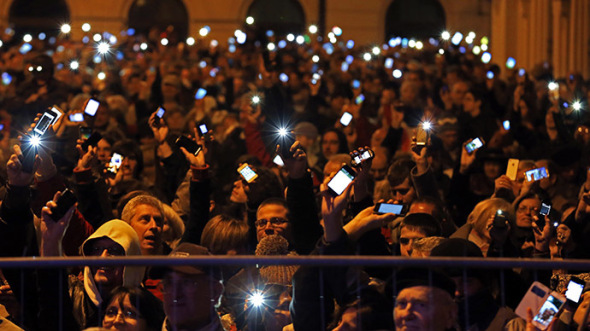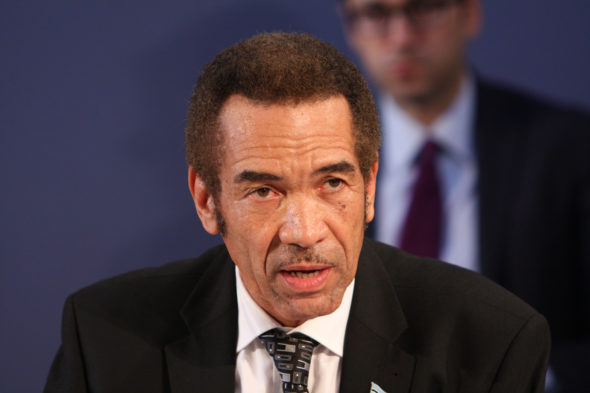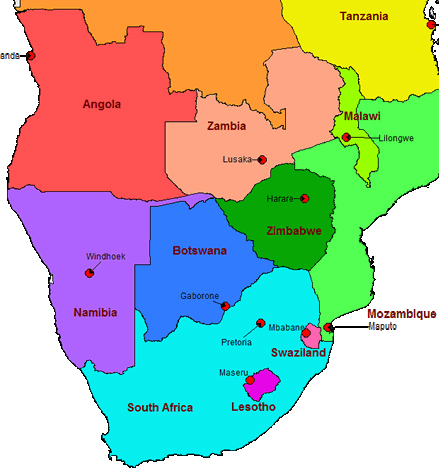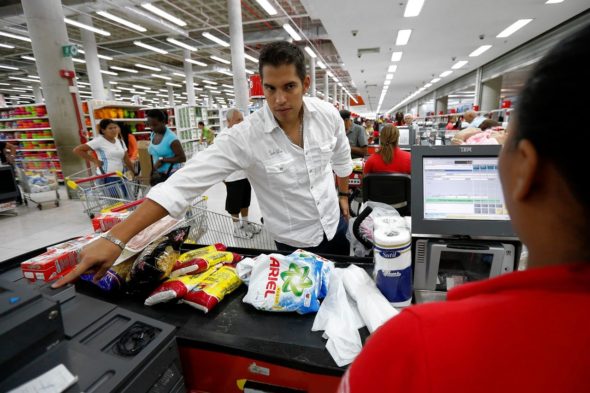News from Hungary, Botswana and Venezuela
Tuesday's World Events — Posted on October 28, 2014

People holds up their mobile phones as they protest against new tax on Internet data transfers in centre of Budapest October 26, 2014. (Reuters/Laszlo Balogh)
HUNGARY – Hungarians revolt against internet tax
Furious with the government plan to impose tax on Internet data traffic, thousands of Hungarians rallied in front of the Economy Ministry in Budapest to protect the freedom of the internet from the ‘anti-democratic’ measure.
Tens of thousands gathered in front of the Economy Ministry building on Sunday, urging the politicians to scrap the plan that will see internet service providers (ISPs) pay 150 forints ($0.62) for every gigabyte of data traffic transferred over their networks.
Although the draft suggests that ISPs would be able to offset corporate income tax against the new tax, the protesters believe that eventually the new tax burden will end up pinned on common users. The Association of IT, Telecommunications and Electronics Companies has already said the tax would force them to raise prices, Reuters reports.
 The rally, organized via Facebook group with over 210,000 followers, said that the move “follows a wave of alarming anti-democratic measures by [Prime Minister Viktor] Orban that is pushing Hungary even further adrift from Europe.”
The rally, organized via Facebook group with over 210,000 followers, said that the move “follows a wave of alarming anti-democratic measures by [Prime Minister Viktor] Orban that is pushing Hungary even further adrift from Europe.”
Protesters held up their smartphones, lighting up the square with their screens. Part of the crowd then marched to the city’s historic Heroes Square, Reuters reports.
“The measure would impede equal access to the Internet, deepening the digital divide between Hungary’s lower economic groups, and limiting Internet access for cash-poor schools and universities,” the press release added, as some 41,000 people signed up to protest on social media.
The organizers of the protest dubbed “100,000 against the internet tax” promised another mass rally on Tuesday, unless the government withdraws the draft legislation within 48 hours.
The ruling Fidesz party promised to submit an amendment to the legislation on Monday, capping the maximum tax payable by individuals at 700 forints ($2.88) per month. The government is trying to close in the gap in the existing tax on telecom sector – 2 forints ($.01) per minute or per text message – as Hungarians use Internet-based services more frequently than traditional phones. The treasury hopes to get as much as 25 billion forints ($102,730,750) from the introduction of the internet tax, the Economy Ministry said, according to Bloomberg.
UPDATE: On Oct. 31, the Daily Telegraph reported that Hungary’s government has suspended plans to introduce a controversial internet tax after huge public protests fueled claims it undermined freedom of information. Prime Minister Viktor Orban announced the government had put the tax plans on hold, adding there would be a “national consultation” about the internet in January.
BOTSWANA – Botswana president’s party secures election victory
GABORONE – Botswana’s ruling Botswana Democratic Party (BDP) secured 33 of 57 parliament seats in national elections, initial results showed, putting President Ian Khama at the helm for a second five-year term.

Botswana President Ian Khama
Residents of the southern African nation, who voted on Friday, re-elected the BDP party that has ruled the diamond-producing country since independence from Britain 48 years ago.
Provisional results show the BDP’s main rival, the Umbrella for Democratic Change (UDC), with 14 seats and the Botswana Congress Party (BCP) with two seats.
Eight seats were yet to be declared. This will be Botswana’s most closely contested election, and is likely to see the BDP’s majority sharply reduced from the 79 percent of seats it won in the 2009 election.
President Khama’s party still enjoys the support of a generation of voters won over with high spending on education and welfare benefits. However, there is growing discontent among younger voters and the urban middle class who say change is due after nearly five decades of BDP rule.

Although Botswana is often seen as one of Africa’s most stable and democratic nations [on a continent often tainted by conflict and corruption], economic growth has slowed as demand for diamonds decreases, and unemployment is about 20 percent.
Khama has drawn criticism for forcing eviction of bushmen from their traditional hunting grounds in the Kalahari Desert and for introducing an unpopular 50 percent tax on alcohol.
The 61-year-old president has said only the BDP is competent enough to rule, and pledged to create jobs and improve water and electricity supply if given another term in office.
Last week, Botswana’s sole power station broke down, forcing it to rely on electricity from neighboring South Africa.
VENEZUELA – Despite Riches, Venezuela Starts Food Rationing
MARACAIBO – Amid worsening shortages, Venezuela recently reached a milestone of dubious distinction: It has joined the ranks of North Korea and Cuba in rationing food for its citizens.

A customer in Caracas uses a fingerprint scanner to buy groceries last month as part of the rationing program. (Reuters)
On a recent, muggy morning, Maria Varge stood in line outside a Centro 99 grocery store, ready to scour the shelves for scarce items like cooking oil and milk. But before entering, Ms. Varge had to scan her fingerprint to ensure she wouldn’t buy more than her share.
Venezuela’s new program of rationing is infuriating consumers who say it creates tiresome waits, doesn’t relieve shortages and [ignores] the far-reaching economic overhauls the country needs to resolve the problem.
“These machines make longer lines,” said Ms. Varge, 50, as she was jostled by people in line, “but you get inside, and they still don’t have what you want.”
The socialist government rolled out the system last month across 36 supermarkets in this western border state, Zulia, whose capital is Maracaibo, with a recent expansion into a select number of state-owned markets in Caracas.

Venezuela is turning to rationing because of shortages caused by what economists call a toxic mix of unproductive local industry – hamstrung by nationalizations and government intervention – and a complex currency regime that is unable to provide the dollars importers need to pay for basics.
The tumbling price for Venezuela’s oil, which has fallen by nearly $15 a barrel since September to $77.65 on Friday, is likely to mean even more scarcity in the cash-strapped country, economists say.
Already, only 30% of the normal level of basic, price-controlled goods were available in a select group of Caracas supermarkets, said a recent survey by Venezuelan polling firm Datanalisis.
“The government is the one that lets the problems flourish,” said Eliseo Fermín, an opposition member of Zulia’s state congress. “Now the average citizen bears the brunt.”
Under the system in place in Venezuela, basic price-controlled items – including milk, rice, coffee, toothpaste, chicken and detergent – are rationed, with the fingerprinting machine used to ensure that a shopper doesn’t return over and over to stock up. It means that consumers are limited to buying up to 2.2 pounds of powdered milk – called “gold” here for its rarity – a week.
Many economists say jettisoning currency and price controls, as well as loosening restrictions on local producers, would alleviate shortages.
Here at Maracaibo’s supermarkets, hot and cranky consumers who were waiting in line recently pointed to the irony of Venezuela, a country with $114 billion in oil sales last year, having to ration toilet paper.
(The news briefs above are from wire reports and staff reports posted at RT News (Russia Today) and Reuters on Oct. 26 and The Wall Street Journal Oct. 22.)
Background
VENEZUELA
- Shoppers said the time waiting in line can stretch to more than five hours, a delay they chalk up to malfunctioning fingerprinting machines.
- “I’ve spent hours standing in line, suffering in the sun,” shrieked a tearful Luzmarina Vargas, clad in a bright pink robe typical of the area’s Wayuu Indians.
- Salvador González, the Zulia state finance director who oversees machines, said officials were requiring machines to be installed at each checkout point in order to shorten lines. Supermarkets must bear the cost of the machines, around $150 each.“Our objective is to guarantee cheap food,” he said in an interview.
- It isn’t just food that’s rationed here. Officials shut off water to homes for up to 108 hours a week, say residents, because of problems with the water delivery system.
- In the birthplace of Venezuela’s oil industry—the first well was drilled here in 1914—the sale of gasoline is also tightly controlled. Scanners read bar codes that are required on car windshields to limit drivers from filling up their sedans more than twice a week. The measure is designed to curb the sale of Venezuela’s heavily subsidized gasoline—which costs less than a penny per gallon—in neighboring Colombia, where a gallon goes for $4.50.
- “This country is falling apart,” said one driver, Darwin Padilla, as he mopped his face with his shirt while waiting in a line of idling cars for more than an hour to fill up. “And as you can see, I can’t get parts to replace my car’s air conditioning, either.”
- But the fingerprinting machines—and the shortages of basics—are irritating consumers, who also must contend with rationed water and gasoline.
- “If I can’t find disposable diapers I use cloth ones,” said Rosa Fernandez, mother of an infant, who noted that to buy diapers she has to show the checkout clerk her child’s birth certificate. “Then I can’t find detergent. Then if I get detergent, there’s no water.” (from the WSJ article above)
Government response:
Venezuelan officials blame the shortages on smugglers who they say buy price-controlled products here and sell them for a handsome profit in neighboring Colombia.
Though economists estimate that about 10% of Venezuelan consumer merchandise winds up in Colombia, Venezuelan President Nicolás Maduro has said that the figure is 40%. He has closed checkpoints along the whole 1,375-mile border at night to stem the flow, and a crackdown on smugglers has led to the arrests of shoppers that officials believe to be planning to sell what they purchase in Colombia, say border guards.
“It is the responsibility of everyone to unite against contraband,” Zulia Gov. Francisco Arias, a member of Mr. Maduro’s Socialist Party, said on a recent TV show. He and other officials say fingerprinting prevents bulk buying for resale more effectively than requiring shoppers to show their national identity cards, a method that is used to track and limit purchases in some Caracas stores. (from the WSJ article above)
ABOUT VENEZUELA'S GOVERNMENT:
For most of the first half of the 20th century, Venezuela was ruled by generally benevolent military strongmen, who promoted the oil industry and allowed for some social reforms. Democratically elected governments have [ruled] since 1959. Hugo Chavez, President of Venezuela from 1999 until his death in 2013, promoted a controversial policy of “democratic socialism,” which [aimed] to alleviate social ills while at the same time attacking globalization and undermining regional stability.(From the CIA World FactBook.)
Under the presidency of Hugo Chávez, Venezuela saw sweeping and radical shifts in social policy, moving away from the government officially embracing a free market economy and towards quasi-socialist income redistribution and social welfare programs. (from wikipedia)
nationalization – refers to the process of a government taking control of a company or industry, which can occur for a variety of reasons. When nationalization occurs, the former owners of the companies may or may not be compensated for their loss in net worth and potential income.
What is wrong with the socialist/communist policy of nationalization?:
Nationalization destabilizes a society and economy, reduces investment, entrepreneurial innovation and economic growth, and has negative consequences for the majority of the population, including the poor. It sends a message to inhabitants and outside investors that private property is not safe. Nationalization destroys jobs and the profitability of enterprises and is a crime against the general populace. It is bad for consumers, workers, the poor and democracy. (read more at moneyweb.co.za)
